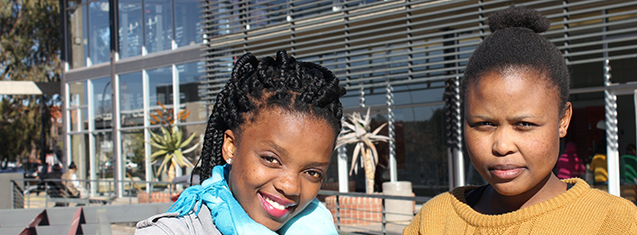
Excited about the prospects of studying in Sweden, Letttie and Moratoe already have their bags packed. Photo: Valentino Ndaba
In 2011 the university signed an exchange programme agreement with Jönköping University (JU), in Sweden. Since the inception of the contract the UFS Department of Social Work has been able to send two second year students to the guest university for a semester annually while also hosting students from JU.
The UFS is one of only 350 partner universities that JU co-operates with on an international level. The university that describes itself as “the most international university on Sweden” welcomes 714 exchanged students annually. This year, their School of Health and Welfare will host two of our Social work students, Moratoe Tshabalala and Lettie Mohoko; who are the fourth duo to take this unique opportunity.
These Kovsies will join the JU from 17 August-20 December 2015. By focusing on Swedish Social work and welfare policy, participation and inclusion, and Old-age care, they intend to use the learning experience to influence our country’s welfare system.
Growing up in Wesselsbron - a small town in the Free State, Lettie has always been passionate about working with people and having a positive impact on their lives. She sees the exchange programme as an opportunity to gain an international perspective which will provide more skills, hence improving her community engagement.
Moratoe, who is from the small town of Senekal, echoed similar sentiments, adding that she is interested in the distinctiveness of Sweden’s social welfare system, which offers free education, where old people get free care from the government, and children get incentives to attend school.
Lettie and Moratoe also volunteer as representatives of the UFS at ENGO Family Care, a non-profit organisation in Bloemfontein.
Dr Anneline Keet, Head of the UFS Social Work Department, believes that the exchange experience enhances the students’ critical thinking, and facilitates their ability to engage with different social welfare systems. While only two students are able to experience the full exchange annually, the rest of the students also benefit from the discussions taking place in class where students from the guest university (JU) join them for a semester.